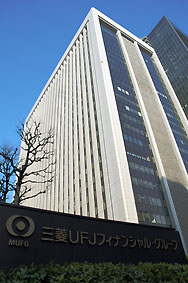Mish’s thoughts on the U.S.’s reliance on China and other countries, the recession (underestimated), the bailout plan (not helpful), and, if you click on the link (So, Who Won The Debate?), the debate between Obama and McCain.
US Treasury to rely on China and the Middle East to finance bailout?
The Wall Street Journal is reporting Financial Troubles Humble U.S.
The U.S. is turning to foreign governments and other overseas investors to buy a good chunk of what could total $700 billion in Treasury debt expected to finance the bailout. Foreign investors also are needed to shore up the depleted capital of the nation’s financial institutions, seen in the plan by Japan’s Mitsubishi UFJ Financial Group to buy a large stake in Morgan Stanley, which is weighed down by bad debt and market distrust.
This is a bittersweet moment in U.S. economic history. In one sense, the growing importance of foreign cash represents the triumph of a half-century of U.S. proselytizing for a global financial system in which money flows from those who have it to those who need it. But it is also an unmistakable sign of U.S. economic decline. The global financial system the U.S. designed had anticipated that American banks and financial firms would be the world’s financial lifeguards; now those institutions are like exhausted swimmers a stroke or two away from drowning.
The financial crisis makes clear how much the interests of foreign lenders have become a top concern in Washington. A big reason the Fed and Treasury stepped in to rescue mortgage giants Fannie Mae and Freddie Mac, say U.S. financial officials, was to reassure foreign leaders including China, which holds roughly $1 trillion in U.S. debt, that U.S. securities were safe. "Superpowers do not normally ask their diplomats to reassure other nations on questions of credit-worthiness," says former U.S. Treasury Secretary Lawrence Summers.
Foreign lenders have a great deal of sway. If they were to dump U.S. government debt — or be unwilling to buy more — the interest rates needed to attract buyers of Treasurys would soar. The already fragile U.S. economy would absorb yet another hit.
China, Saudi Arabia and other big foreign holders are unlikely to take antidollar measures precisely because they own so much U.S. debt. To the extent the dollar declines, so does the value of those nations’ holdings. Mr. Summers calls this situation "the financial balance of terror."
But it is naive to assume that this so-called balance will protect U.S. interests indefinitely. Senior Chinese economists have voiced growing dismay about the outlook for the dollar, and the introduction of an additional $700 billion in debt might drive the currency’s value down further, at least in the short term. "I think foreigners are being taken for a ride by the U.S. government," says Andy Xie, an independent economist in Shanghai.
Sovereign-wealth funds — huge government investment funds — have largely sat on their hands rather than buy additional stakes in U.S. financial firms. China Investment Corp., for instance, has been wary of increasing its investment in Morgan Stanley after it was criticized sharply at home for taking equity stakes in U.S. financial companies that have nose-dived.
Domestically, the reliance on foreign money means a loss of autonomy that Americans are simply going to have to get used to. Part of the accommodation is already occurring. The controversy over investments by sovereign-wealth funds has been reversed. Last year, lawmakers worried the funds would gain political influence by investments in U.S. companies; now U.S. policy makers are worried that they won’t buy new stakes. Efforts to erect restrictions against foreign trade may also lose momentum. The U.S. needs the world’s money more than it thought it would and won’t want to rile potential lenders.
Peak US Influence
The US can no longer tell the world what to do and when. The sooner Congress, the next president, and even US citizens figure this out, the better off we will be. We need to start living within our means. Sadly, neither McCain nor Obama has figured this out as evidenced by the pathetic debate on economic issues. See So, Who Won The Debate? for more analysis.
Nonetheless, should foreign demand for US treasuries drop, there is enormous pent up demand for treasuries in the US. Yields may not be attractive, but they are positive. Compared to -18% returns in the S&P this year, US treasuries have been a safe haven.
People are still underestimating how severe this recession will prove to be. This holds true whether any bailout or economic stimulus passes or not. In fact, the recession will be prolonged if a bailout package does pass.
The bailout will not create any jobs. Instead, the bigger the bailout the smaller the pool of available funds for more worthwhile projects. And without jobs (real jobs not makeshift ones) there can be no recovery.



